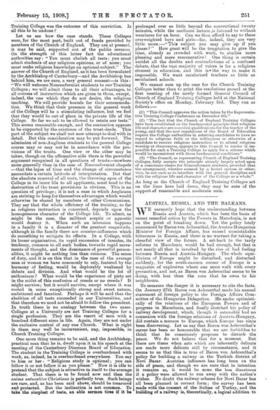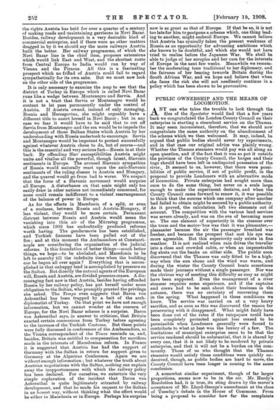AUSTRIA, RUSSIA, AND THE BALKANS. AV E earnestly hope that the
understanding between Russia and Austria, which has been the basis of recent remedial action by the Powers in Macedonia, is not on the point of breaking down. Yet the policy lately announced by Baron von Aehrenthal, the Austro-Hungarian Minister for Foreign Affairs, has caused unmistakable bitterness in Russia, and there is no warrant for taking a cheerful view of the future. A set-back to the tardy reforms in Macedonia would be bad enough, but that is not nearly all that is involved by the rise of bad feeling between Russia and Austria-Hungary. The whole equi- librium of Europe might be disturbed, and disturbed suddenly, for the south-eastern corner of Europe is a magazine of explosives where one must walk with every precaution, and not, as Baron von Aehrenthal seems to be doing, with less than the care that he owes to his neighbours.
To measure the danger it is necessary to cite the facts. On January 27th Baron von Aehrenthal made his annual statement of foreign policy to the Foreign Affairs Com- mittee of the Hungarian Delegation. He spoke optimisti- cally of the relations of the European Powers and of progress in Macedonia, and finally sketched his policy of railway development, which, though it ostensibly had no connexion with the foreign relations of Austria-Hungary, did contain a menace to Europe, which Europe has since been discovering. Let us say that Baron von Aehrenthal's career has been so honourable that we are forbidden to think that he consciously proposes to disturb the peace. We do not believe that for a moment. But there are times when acts which are inherently delicate are made more delicate still by circumstance, and it seems to us that this is true of Baron von Aehrenthal's policy for building a railway in the Turkish district of Novi Bazar. Austrian influence has long been on the side of peace, and though we are sure that in intention it remains so, it would be none the less disastrous if a policy were allowed to run away with the nation's wishes. No doubt the railway scheme for Novi Bazar has all been planned in correct form ; the survey has been made with the consent of the Sultan of Turkey, and the building of a railway is, theoretically, a logical addition to
the rights Austria has held for over a quarter of a century of making roads and maintaining garrisons in Novi Bazar. Besides, railway development is a very desirable kind of commercial enterprise, and if there were Kto other matters dragged in by it we should say the more railways Austria built the better. Her railway programme, of which the Novi Bazar line is the chief item, proposes extensions which would link East and West, and the shortest route from Central Europe to India would run by way of Vienna and the Piraeus. All this is a fascinating prospect which no frignd of Austria could fail to regard sympathetically for its own sake. But we must now look on the other side of the programme.
It is only necessary to examine the map to see that the district of Turkey in Europe which is called Novi Bazar runs like a wedge between Montenegro and Servia. And it is not a tract that Servia or Montenegro would be content to let pass permanently under the control of Austria. If Austria owned, instead of only managing, Bosnia and Herzegovina, she might arguably have a different title to assert herself in Novi Bazar ; but in any case we fear it would have to be said that to cut off Servia from Montenegro and the sea would he to impede the development of those Balkan States which Austria by her understanding with Russia undertook to encourage. Servia and Montenegro would be impotent to protest successfully against whatever Austria chose to do, but of course—and this is the essential and very serious fact—Russia is at their back. By offending Slav susceptibilities Austria might unite and vitalise all the powerful, though latent, Slavonic sentiments in Europe. The aroused Slavonic sympathies of Russia would naturally react upon the anti-Slavonic sentiments of the ruling classes in Austria and Hungary, and the quarrel would go from bad to worse. We suspect that the force of a Slavonic movement would surprise all Europe. A disturbance on that scale might only too easily draw in other nations not immediately concerned, for none could remain indifferent to a violent rearrangement of the balance of power in Europe.
As for the effects in Macedonia of a split, or even of a coolness, between Russia and Austria-Hungary, if less violent, they would be more certain. Permanent distrust between Russia and Austria would mean the vanishing into thin air of the Miirzsteg programme, which since 1903 has undoubtedly produced reforms worth having. The gendarmerie has been established, and Turkish finances have been pulled out of the fire ; and at this moment the Ambassadors at Constanti- nople are considering the organisation of the judicial reforms. Is this foundation of better things—much better things, we hope—to be abolished, and Macedonia to be left to anarchy till the indefinite time when the building can be begun all over again ? Everything that is accom- plished in that unhappy land is accomplished by pressure on the Sultan. But directly the natural agents of the European will, Russia and Austria, are divided pressure ceases. A dis- couraging fact now is that Austria, besides having offended Russia by her railway policy, has put herself under some obligation to the Sultan, who promptly granted the privilege she asked. The Temps even suggests that Baron von Aehrenthal has been trapped by a bait of the arch- diplomatist of Turkey. On that point we have not enough information, but we cannot wonder at the concern of Europe, for the Novi Bazar scheme is a surprise. Baron von Aehrenthal says, in answer to criticism, that Britain exacted certain concessions from Turkey before agreeing to the increase of the Turkish Customs. But these points were fully discussed in conferences of the Ambassadors, as the Vienna correspondent of the Times reminds us, and, besides, Britain was entitled to compensation for sacrifices made in the interests of Macedonian reform. In France it is suggested that Austria has had the support of Germany with the Sultan in return for support given to Germany at the Algeciras Conference. Again we are without enough information ; but whatever the truth about Austrian negotiations with the Sultan, nothing can explain away the inopportuneness with which the railway policy has been declared. For ourselves, we entertain the very simple explanation of the• incident that Baron von Aehrenthal is quite legitimately attracted by railway development, and that he made his request to the Sultan in an honest way, without thinking what the effect would be either in Macedonia or in Europe. Perhaps his surprise
now is as great as that of Europe. If that be so, it is not too late for him to postpone a scheme which, one thing lead- ing to another, might embroil Europe. We cannot believe that Austria has cynically taken the present weakness of Russia as an opportunity for advancing ambitions which she knows to be doubtful, and which she would not have tried to realise before the Japanese War. We shall be able to judge of her scruples and her care for the interests of Europe in the next few weeks. Meanwhile we remem- ber the moderating tone traditional to her diplomacy, and the fairness of her bearing towards Britain during the South African War, and we hope and believe that when she faces the risk she will not needlessly continue in a policy which has been shown to be provocative.





































 Previous page
Previous page